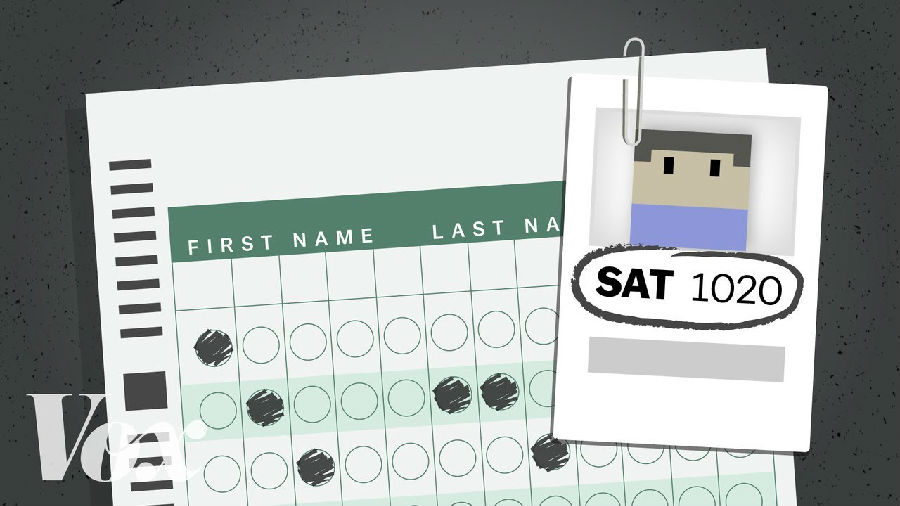These 50 cards represent every person who took the SAT college entrance exam in 2017.
这50张卡片代表了参加2017年美国高考(SAT)的所有考生。
In America, this score -- this ranking of students -- is hugely important.
在美国,这门考试的分数——以及学生的排名——要多重要有多重要。
Elite schools like Yale or Harvard select the large majority of their students from this pile -- the top 1 percent of test takers.
耶鲁或哈佛等一流名校主要从这一波——也就是考试成绩最高的那1%的考生——中间挑他们的学生。
And it's not just super elite schools.
不止一流名校如此。
A flagship state school, like the University of Georgia, admits most of its students from this pile.
佐治亚大学这样的公立旗舰大学也会从这一波考生中间挑他们的学生。
And even a less selective school, like Wichita State University, admits most of its students from this pile.
即使是威奇托州立大学这样不那么挑剔的学校,也会从这堆学生中录取他们的大部分新生。
All three of these ranges are higher than the average score.
而所有上述三个级别的分数都是高出平均分的。
This is why people pay lots of money to train for the test with companies like Princeton Review, Kaplan, and PrepScholar.
这就是人们为什么要花重金报Princeton Review, Kaplan,PrepScholar之类的补习班的缘故。
A slightly higher score can make a big difference.
分数稍微高那么一点点,命运就可能大不一样。
That’s also why some really rich people got caught paying lots of money to help their kids cheat on the test.
这也是为什么有些富豪因为花大价钱帮他们的孩子在考试中作弊被抓的原因。
Dozens of coaches, actors, and CEOs...
“数十名教练、演员和CEO……”
Felicity Huffman accused of paying $15,000...
“费利西蒂·霍夫曼被控支付了1.5万美元……”
...to have someone either take the exam for their child, or to correct their child's answers afterward.
“…让别人为他们的孩子替考,或者考后改答案。”
Your place in this ranking can have a huge impact on what opportunities come your way.
你在这个排名中的位置会对你未来拥有怎样的机遇产生巨大的影响。
So it’s worth asking...what exactly does the SAT measure? What does this score actually say about you?
那么……SAT到底衡量的是什么能力,这个分数到底能代表你什么这个问题就很值得一问了。
To answer this question, we have to start with this man: Carl Brigham.
要回答这个问题,我们还得从这哥们儿——卡尔·布里格姆说起。
He was a young psychologist during World War I who was obsessed with measuring human intelligence.
他是一战时的一名年纪轻轻,但非常痴迷于测量人类智力的心理学家。
He would devise puzzles for soldiers that supposedly measured their intelligence
他会为士兵们设计测智商的拼图游戏,
by testing whether they could decode symbols, draw missing parts of a picture, or even complete maze.
测试的方法是看他们是否能够读懂某些符号,画出图画中缺失的部分,甚至是走出迷宫等。
He concluded that white people of English, Scottish, and Dutch descent were smartest.
他由此得出了一个结论,那就是英国、苏格兰和荷兰血统的白人最聪明。
At the very bottom were black people and recent immigrants from Poland and Italy.
最不聪明的是黑人以及波兰和意大利过来的新移民。
He ignored the fact that some test takers didn't speak English.
但他忽视了有些考生根本就不会英语这一事实。
So answering a question like "How many are 60 guns and 5 guns" could be difficult.
所以,“60支枪加5支枪一共是多少支枪”这样的问题都会变成很难回答的问题。
He ignored how some people were barred from receiving an adequate education.
他也忽视了一些人根本就被禁止接受充分的教育这一事实。
Which meant some puzzles, like this one, could be quite challenging.
这就意味着,有些题,比如这一道,会变得非常有挑战性。
He just assumed the scores reflected the innate intelligence of different races.
他就觉得,那些分数反应的是不同种族的人群天生的智力水平。
And because of this, he wrote that black people were so much less intelligent
正因为如此,他写道,黑人的智商实在低得太厉害,
that America should worry about "racial admixture" which would "incorporate the negro into our racial stock" -- and "taint" the population.
美国应该对“种族混合”感到担忧,因为那样做会将“把黑人纳入我们的种族血统”——“玷污”美国人民。
After World War I, he wrote a new test to measure the intelligence of prospective college students.
一战结束后,他又出了一套衡量准大学生的智力的测试。
He included word and number puzzles, like: Pick the three words below that are most related:
这次,他还增加了文字和数字游戏,比如,从下面的词中选出最为相近的三个词:
Chops, liver, round, fore-quarter, rump, sirloin.
排骨,猪肝,圆形,前半部分,臀部,牛腰肉。
Yeah, I don't know, either.
嗯,我也不会。
Anyway, Brigham's exam was called the Scholastic Aptitude Test. The SAT.
总之,布里格姆设计的考试被称为了“学术能力测试”。可不就是SAT嘛。
The SAT wasn't very popular at first.
一开始,SAT并不是很受欢迎。
In 1941, just 10,000 people took the exam.
1941年,只有1万人参加。
That was just 1 percent of high school seniors.
仅占到了高中毕业生的1%。
Most colleges just didn't need it.
大多数大学也根本不认这个测试。

They didn't have that many applicants, partially because less than 10 percent of people Americans went to college.
因为他们根本就没有那么多需要筛选的考生,部分原因在于在当时上得起大学的人还不到10%。
So they could spend more time with each application.
所以他们有足够的时间考察每一位申请者。
And many elite schools administered their own entrance exams.
而且,许多一流大学都自己出卷。
Then, World War II ended.
接着,二战也结束了。
Millions of troops returned to the US.
数百万军队回到了美国。
And there was a new benefit white veterans could take advantage of: the GI Bill — which helped them pay for college.
白人退伍军人还有一项新福利可享:《退伍军人权利法案》,一个帮助他们支付大学学费的法案。
And college enrollment skyrocketed.
于是,大学入学人数一夜激增。
All of a sudden, colleges had way more applications to sort through.
突然间,大学要筛选的申请远比之前多了起来。
And they needed a tool to help them figure out who to accept.
于是,他们需要一个工具来帮助他们决定接受谁不接受谁。
So they started requiring the SAT, which gave them some numerical way to rank applicants.
所以,他们开始要求SAT成绩,让他们能够通过数字方法来给申请人排名。
Meanwhile, the College Board started saying their exam measured college preparedness.
与此同时,美国大学理事会开始声称,他们的考试衡量的是考生有没有准备好迎接大学生活。
And every few years, they proved it --
而且,每隔几年,他们还都证明了这一点——
by saying their exam, along with high school grades, were a good predictor of how well students do in college.
说这一考试,连同高中成绩,能够很好地预测学生在大学里会有怎样的表现。
They still do this.
他们现在还在这么做。
For example, here's that analysis from this year.
例如,这是大学理事会今年的分析。
It shows that high school GPA alone gets us about halfway to predicting college GPA.
这个图想说的是,高中成绩在预测大学成绩时只能起到一半的作用。
But the College Board sold schools on this next part:
大学理事会将接下来的乖卖给了学校:
If we consider SAT scores along with high school GPA, this prediction can get a bit better.
如果我们把SAT的分数和高中GPA放到一起考量,预测可能会更准确一些。
And colleges bought into this rebranding, and started asking for SAT scores.
大学也接受了这一包装,开始要求考生提供SAT成绩。
In 1941, just 10,000 students took the SAT.
于是,1941年还只有1万名学生参加SAT考试。
By 1950, 80,000 students took the exam.
到1950年,就已经有8万名学生参加了。
By 1960, 800,000 students took the SAT.
到1960年,参加SAT考试的考生人数已经达到了80万。
By the next decade, it rose to a million.
在接下来的十年里,这个数字直接上升到了一百万。
Now, more than 2 million students take the exam each year.
如今,参加这场考试的考生人数每年都不下200万。


